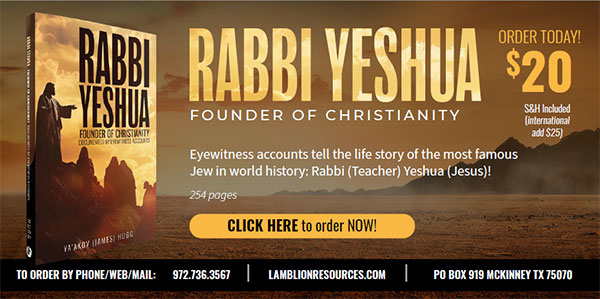Ask any Christian the name of the Messiah, and they will almost always say, “Jesus.” That Name above all names is correct, but it is actually the Greek (Iesous), then the German (Jesus, where J is pronounced Y), and now the English version of our Savior’s given Name. Mary and Joseph were both told to name their Son Yeshua, which means “God is Salvation.”
We do not believe Jesus is offended when we pronounce His wonderful Name in our native tongue, any more than I would be offended to hear my name pronounced differently by a friend who speaks a different language. But it is essential to understand the Jewishness of Jesus, and to realize that when He ministered on the earth, His disciples first referred to Him as “Rabbi.”
Author of Rabbi Yeshua
Dr. James Hugg, a long-serving trustee of Lamb & Lion Ministries, has written Rabbi Yeshua: Founder of Christianity, a book that emphasizes Jesus’ Jewish roots, along with the Jewish flavor of the rest of the Gospel narratives. In an age when many Jews are still suspicious of the (primarily) Gentile Church, given the persecution they have experienced at the hands of Christians, it is important to convey to them that the original followers of “The Way” were Jews, and that Yeshua fulfilled the prophetic expectations of the Jewish prophets.
James Hugg learned of his own personal Jewish heritage as an adult, but all of us who follow Jesus/Yeshua would benefit by respecting the Jewish context of the Founder of Christianity.
Interviewing the Author
James, what motivated you to undertake this project, and how long did it take you to pull together all the texts?
James Hugg: We were living in Israel for seven years, active in a Messianic Jewish congregation, when I asked the Lord first to teach me to be a fisher of men, especially for the not-yet saved Jews. And second, to participate in the reconciliation of Gentiles to the Jewish Yeshua, supporting fulfillment of the Elijah reconciliation prophecy at the end of the book of Malachi.
The answer to my prayer was an urge to write a book combining multiple teaching features:
- use the Messianic Bible translation of the late Dr. David Stern;
- harmonize the four Gospel eyewitness accounts;
- put the accounts in chronological order;
- point to and quote fulfilled prophecies in the life of Yeshua; and
- insert my editorial comments including several essays to explain Jewish Biblical traditions.
I worked on this writing project, off and on, for almost 20 years.
You weave in some essays to expand on the straightforward narrative conveyed in the Gospels and other biblical texts. How did you choose which topics or controversies (like the timing of Yeshua’s birth and death) to address?
James Hugg: You recall that the lead character in “Fiddler on the Roof” was Tevye, who explained how vital “tradition” is in Jewish life. Well, it’s the same in the Gentile church. Because we have lost connection with the Jewish roots of our Christian faith, we have substituted manmade traditions instead. Two of the best examples concern the birth and death of Yeshua (Christmas and Easter). One essay shows how we can calculate with reasonable certainty that Yeshua was born during the Feast of Sukkot (or Tabernacles) in September or October, 5 B.C., rather than on December 25th. Furthermore, Yeshua was likely born in a house rather than in a stable. Another essay solves the mystery of how Yeshua fulfilled His oft-repeated prophecy that he would spend three days and three nights in the tomb before His resurrection, rather than a traditional Good Friday crucifixion.
Traditions can be good when we label them as such. But it is crucial to distinguish Biblical accounts from man’s traditions.
So many Gentile Christians today say that they love Jesus, but feel no particular love for the Jewish people. Or, if they do love Jews that they know personally, they are ambivalent or hostile toward the nation of Israel. What would you say to them?
James Hugg: The Bible is primarily a story about God’s dealings with a particular people called the Hebrews, or the Israelites, or more commonly today, simply the Jews. God chose them to make an example of the Jews, blessing them when they obeyed and punishing them when they did not, but never wavering in His love and promises to them.
The most significant evidence that Yeshua is coming soon is the existence of the nation of Israel. God made many promises to Israel, and the fact that He is keeping those promises, despite the human failures of the Jews, should strengthen our faith that He will keep every promise to the predominantly Gentile Church. Yeshua said that the way we treat the least of His Jewish brothers and sisters is how we are treating Him. When we bless Israel, called “the apple of God’s eye,” God reciprocates by blessing us.
What would you say to Jewish skeptics who consider Jesus to be the “Gentile Messiah,” but certainly not the Anointed One anticipated by the Jewish prophets?
James Hugg: The Jewish prophets anticipated two messiahs! The one for whom the Jews were and still are waiting is called “Messiah, Son of David,” or the Conquering King. He’s the Messiah the Palm Sunday crowds wanted to crown as their king—a warrior to defeat the Roman conquerors. But the Jewish sages identified a second “Messiah, Son of Joseph,” or the Suffering Servant. Very few Jews were waiting for that Messiah, but that is precisely the role that Yeshua played.
No one else could possibly be the Messiah—it is mathematically certain that Yeshua is the only candidate. He came at the appointed time, according to Daniel’s and Balaam’s prophecies. He had the perfect genealogy, recorded by Matthew and Luke. Yeshua lived a sinless life, as He fulfilled over one hundred Messianic prophecies, offered Himself as the perfect Passover Lamb sacrifice, wore our crown of thorns, was crucified in our place, died and defeated death, rose from the grave, and ascended to Heaven to sit at God’s right hand. Now, when Yeshua returns, the Jews will learn that one perfect Jew, Rabbi Yeshua, fulfilled both Messiah prophecies.
You and your family made aliyah, living in Israel for seven years. What did you learn as you dwelt among the Jewish people of Eretz Yisrael?
James Hugg: I was very pleasantly surprised to encounter many Jews who seemingly love the Lord God and are seeking Him fervently. They take very seriously the greatest command to love God with all their heart, soul, mind, and strength. God promised in Deuteronomy that if we seek Him with all our heart and soul, we will find Him. I believe that we are beginning to see a flood of Jews find Rabbi Yeshua as their Messiah.
As a long-serving trustee with Lamb & Lion Ministries, how does our message proclaiming the soon return of the Messiah dovetail into both the Gospel and the Jewish origins of our faith?
James Hugg: I have been a trustee since 1982 and have witnessed many signs of the times awaken as prophecies begin to be fulfilled. Never before have we seen such a convergence of all types of signs.
I don’t know when Yeshua will return to rapture His bride or when the Tribulation will begin, but I know we are in the season, and I pray that any moment He will call us upward to meet Him in the clouds. In less than five more years, we will celebrate 2,000 years since His resurrection. His return is sooner than ever before.
Will the Son of Man find faith on the earth when He returns (Luke 8:8)? True faith certainly incorporates the Jewishness of our savior Yeshua and understands the Jewish roots of our Christian faith.
Resource
Rabbi Yeshua: Founder of Christianity will be a stimulating read and a valuable resource for anyone who wants and dares to understand that Jesus came as a Jew, first shared the Gospel with Jews, and is coming again to reign as King of the Jews. The eyewitness accounts it conveys offer a clear understanding of the Jewish roots of the Christian faith—making it a must-read and a life-altering gift for Jews and Gentiles alike.







